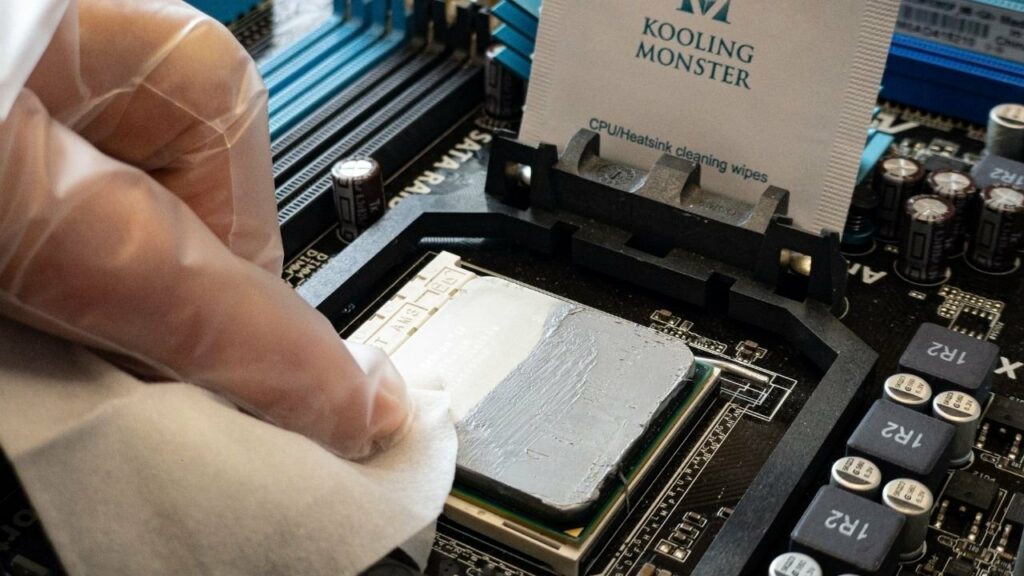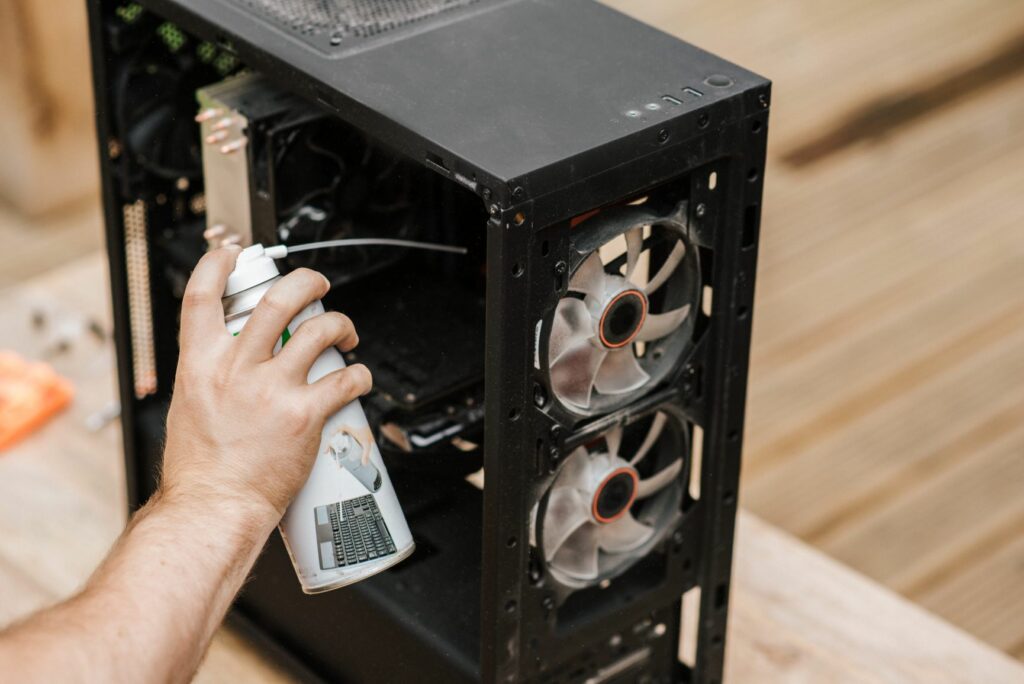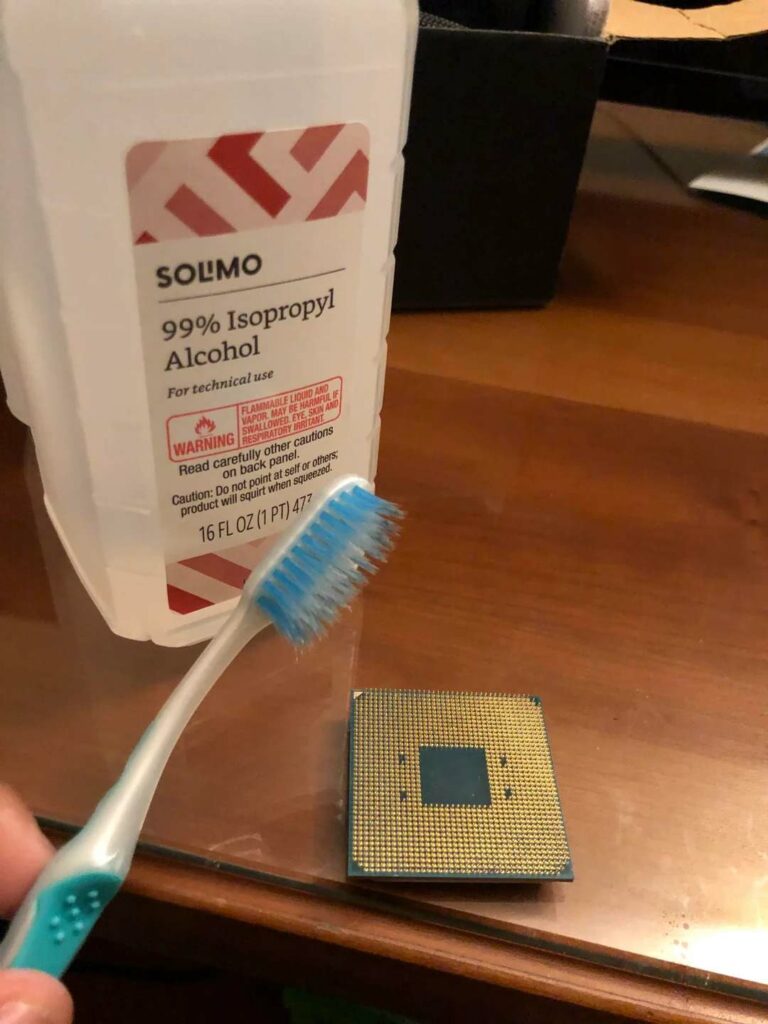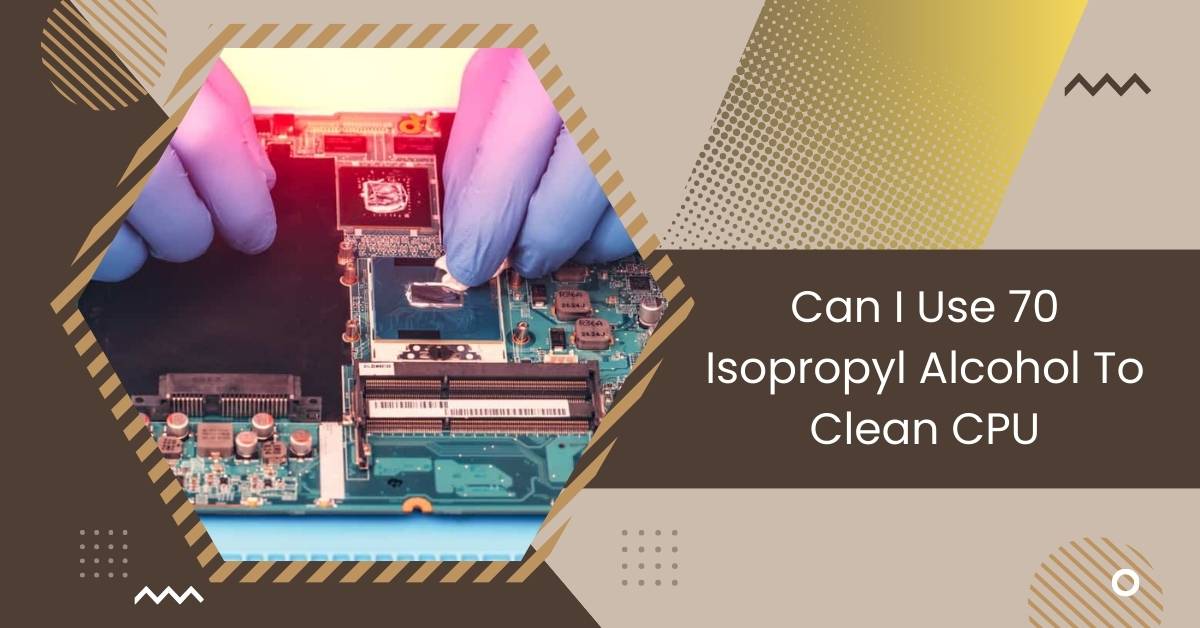Isopropyl alcohol, commonly called rubbing alcohol, is a versatile cleaning agent for dissolving dirt, grease, and grime.
Yes, you can use 70% isopropyl alcohol to clean a CPU effectively. It helps remove dirt and grime, ensuring optimal performance. Using it safely and following proper cleaning procedures is essential for best results.
This article will explore whether 70% isopropyl alcohol is suitable for cleaning CPUs and discuss the necessary precautions.
Understanding Isopropyl Alcohol
Understanding isopropyl alcohol is essential for knowing how it works. Isopropyl alcohol is a clear liquid that smells strong.
People often use it to clean things because it can remove dirt and germs. It dries fast and leaves almost no leftovers.
Isopropyl alcohol is like a helper for cleaning. It can clean many things, not just CPUs. You can find it in stores easily.
It’s essential to be careful because it can be dangerous if you don’t use it correctly. Understanding what it is and how it works helps keep you safe when you use it.
Cleaning CPUs

Cleaning CPUs is about keeping them free from dirt and dust. CPUs are like the brains of computers. They work hard and get hot.
Dust and dirt can make them slow down or stop working. So, it’s essential to clean them often. You can use things like isopropyl alcohol to clean CPUs.
But you have to be careful. If you wash them the wrong way, you might damage them. So, learning how to clean CPUs is good to keep them working well.
Can You Use 70% Isopropyl Alcohol To Clean a CPU?
Yes, you can use 70% isopropyl alcohol to clean a CPU. Isopropyl alcohol is a liquid that helps remove dirt and dust from the CPU.
It’s like a cleaner for electronic parts. The 70% kind is good because it has some water, which helps clean it better.
But you have to be careful when using it. You might damage it if you use too much or clean the CPU too hard. So, it’s essential to follow the proper steps to clean your CPU safely with isopropyl alcohol.
Effectiveness of 70% Isopropyl Alcohol
The effectiveness of 70% isopropyl alcohol is good. It’s like a strong cleaner that helps remove dirt and germs.
The 70% kind is good because it has some water, which allows it to clean better. But it’s less intense than the higher percentage.
It may take a little longer to clean things with it. But it still works well for most cleaning jobs. Just follow the instructions and be careful when using it to avoid damaging anything.
Best Practices For Cleaning A CPU

Best practices for cleaning a CPU involve several essential steps to ensure it’s done safely and effectively:
- Power Off and Disconnect: Before cleaning, always power off the computer and disconnect the CPU from the power source to prevent electrical accidents.
- Use Gentle Materials: Choose soft, lint-free cloths or cotton swabs for cleaning to avoid scratching or damaging the delicate surfaces of the CPU.
- Apply Isopropyl Alcohol Sparingly: When using isopropyl alcohol, apply it sparingly to the cleaning cloth or swab. Too much liquid can seep into sensitive areas and cause damage.
- Avoid Excessive Force: Gently wipe the CPU surface with light pressure to remove dust and dirt. Avoid applying excessive force, as it can damage the components.
- Allow Adequate Drying Time: After cleaning, allow the CPU to air dry completely before reinstalling it in the computer. This ensures that no moisture remains, which could cause malfunctions.
- Handle with Care: Throughout the cleaning process, handle the CPU carefully to prevent accidental drops or impacts that could result in damage.
Also Read: Pre Memory CPU Initialization Is Started – Steps By Steps!
Is It Fine To Use 70% Alcohol To Clean CPU Thermal Paste?
Using 70% alcohol to clean CPU thermal paste is generally okay, but caution is essential. Isopropyl alcohol, like the 70% kind, can help dissolve and remove thermal paste effectively.
However, water is less intense than higher concentrations because it contains water. Cleaning the thermal paste completely may take a bit longer.
Just apply the alcohol sparingly to avoid excessive moisture getting into sensitive CPU areas. Following the proper steps and being careful will help ensure your CPU is cleaned safely and effectively.
Precautions When Using Isopropyl Alcohol

- Ensure Proper Ventilation: Work in a well-ventilated area to avoid inhaling fumes from the isopropyl alcohol, which can be harmful.
- Avoid Flames and Sparks: Isopropyl alcohol is highly flammable, so keep it away from open flames, sparks, or ignition sources.
- Use in Moderation: Apply isopropyl alcohol sparingly to avoid excess liquid buildup, which can potentially damage electronic components.
- Keep Away from Eyes and Skin: Avoid direct contact with eyes, skin, and mucous membranes. In case of contact, flush affected areas with water immediately.
- Store Properly: Store isopropyl alcohol in a tightly sealed container away from heat and sunlight to prevent evaporation and degradation.
- Handle with Care: Use caution when handling isopropyl alcohol to prevent spills, especially around electronic devices.
- Work in a Controlled Environment: Ensure your workspace is clean and clutter-free to minimize the risk of accidents while handling isopropyl alcohol.
- Dispose of Properly: Dispose of used isopropyl alcohol and cleaning materials according to local regulations and guidelines.
- Keep Away from Children and Pets: Store isopropyl alcohol out of reach of children and pets to prevent accidental ingestion or exposure.
- Wear Protective Gear: Consider wearing gloves and safety goggles when working with isopropyl alcohol to protect your skin and eyes from potential contact.
Also Read: Can A Motherboard Bottleneck A CPU – Avoid Bottleneck Risks!
Can I Use 70 Alcohol To Clean GPU?
Yes, you can use 70% alcohol to clean a GPU. Isopropyl alcohol, like the 70% kind, is commonly used for cleaning electronic components due to its ability to dissolve dirt and grime effectively.
However, it’s essential to be cautious when cleaning a GPU. Make sure to power off the computer and disconnect the GPU from the power source before cleaning. Use a soft cloth or cotton swab dampened with alcohol to wipe the GPU’s surface gently.
Allow it to air dry completely before reinstalling it in the computer. Following these steps will help ensure safe and effective cleaning of your GPU.
Alternative Cleaning Methods
Alternative cleaning methods for GPUs include using compressed air cans or electronic air blowers to remove dust and debris from hard-to-reach areas.
Additionally, speciality electronic cleaning solutions designed specifically for delicate electronic components can be used as an alternative to isopropyl alcohol.
Also Read: Why Is My PC Using My CPU Instead Of GPU – A Complete Guide!
Conclusion
In conclusion, 70% isopropyl alcohol is safe and effective for cleaning CPUs and GPUs. However, following proper procedures and precautions is essential to avoid damage. Alternative methods like compressed air cans or speciality cleaning solutions are also viable.
Common Questions
1. What Is The Difference Between 70% And 90% Isopropyl Alcohol?
The primary distinction is the water content: 70% IPA has 30% water, while 90% IPA has only 10% water. Higher concentrations evaporate more quickly and leave behind less residue.
2. Can I Use Other Types Of Alcohol To Clean My CPU?
While other types of alcohol may be effective cleaners, it’s best to use isopropyl alcohol due to its purity and compatibility with electronics.
3. Is It Safe To Use Compressed Air To Clean A CPU?
Compressed air can be used to remove dust and debris from a CPU. Ensure the CPU is powered off and use short bursts of air to avoid damaging components.
4. How Often Should I Clean My CPU?
It’s recommended to clean your CPU every few months or when you notice a dust or thermal paste residue buildup.
5. Can I Clean A CPU Without Removing It From The Motherboard?
Yes, you can clean a CPU without removing it from the motherboard. However, do not apply excessive pressure or liquid directly onto the CPU surface.
Also Read
- CPU Usage Drops When I Open Task Manager – Ultimate Guide!
- Why Is My PC Using My CPU Instead Of GPU – A Complete Guide!
- Dead CPU or Motherboard – All You Need To Know In 2024!

Hi everyone, Johns Jack here, your approachable tech aficionado! I’m passionate about CPUs and thrive on keeping up with the newest tech developments. Join me as we delve into the dynamic realm of technology! Visit: Techy Impacts

